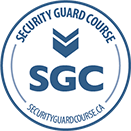This specialized 50hr online course meets and exceeds the syllabus requirements of the Ontario Ministry of the Solicitor General. It is delivered 100% online and has been updated recently to reflect any changes in relevant legislation.
As a private investigator in Ontario you will have to deal with challenging situations and will require proficient training to be able to handle them. We offer a comprehensive private investigator course that is aligned with the Ministry’s 50hr syllabus and meets its requirements. Our curriculum will also give you all the practical tools and training you need to be successful.
Upon request, our students also receive a supplemental practice test to further prepare for the exam.
Why take our course?
Our in-depth private investigator course exceeds the syllabus requirements of the Ontario Ministry of the Solicitor General. The 50-hour course is delivered completely online, and has been designed to help prepare students to take the Ministry’s provincial exam. Consisting of 9 modules, the course will teach key lessons that all students should be familiar with in order to carry out their duties as a private investigator in accordance with the
Private Security and Investigative Services Act, 2005 (PSISA). Upon completion of our Private Investigator course students will have a solid foundation to begin a career in investigations.
What types of jobs can you get with a private investigator licence?
When you are a licensed private investigator there are a variety of jobs that you will be able to pursue. The official descriptions of what your license allows you to investigate include:
- The character or actions of a person
- A person’s business or occupation
- The location of a person or property
The Private Investigator Syllabus
The lessons in the private investigator course will cover a variety of topics, teaching students the legalities and practical knowledge they need to be an investigator. Below you will find a brief overview of the topics covered in our course.
Introduction to the Private Investigator Course and Government Testing Requirements/Procedures
This lesson is designed to prepare aspiring private investigators for the Ministry’s mandatory exam. It will outline key areas that you should be familiar with in order to pass the exam.
Introduction to the Private Investigation Industry
This lesson offers a brief history of the investigation industry and what private investigators can expect in Ontario. Learning about the history of the industry will help you gain a valuable understanding of where the industry began and how far it has come.
The Private Security and Investigative Services Act, 2005 (PSISA)
As a private investigator, the
Private Security and Investigative Services Act, 2005 is your code of conduct and legislates your responsibilities. Students should study the Act and be aware of their duties and restrictions while working in the field to ensure they do not work outside any regulations and are following relevant laws.
Provincial and Federal Statutes
While you won’t be an officer of the law (peace officer), you will still be working within the federal and provincial statutes that relate to the industry. There are certain regulations that you need to be aware of, and this lesson will outline them. You will gain a comprehensive understanding of the statutes that apply to your role.
Criminal and Civil Law
Private investigators are expected to work in accordance with criminal and civil legislative and procedural requirements, while abiding by the policies of their own organization. It can be difficult to balance all the regulations you need to work within, especially in a high pressure position such as this. This module will teach you how to achieve an optimal balance and be successful in your role.
Investigative Techniques
Investigations will be a significant part of your role. You may be hired to follow a spouse suspected of being unfaithful, or to track down the location of someone. Whether you are hired to work on a civil or a criminal case, there is one thing you can be sure of: you will need analytical investigative skills to get the job done and professional conduct to ensure your work supports the legal case you are assisting with. Research, surveillance, interviews, and the use of special equipment will all be covered. We won’t just teach you how to use these techniques — we will also teach you when it’s appropriate to use them.
Principles of Ethical Reasoning and Decision-Making
As a private investigator you will have to work on a wide range of cases that will require a working knowledge of legal human rights. It may be hard to admit, but everyone has their own personal biases. Having these biases is a part of human nature however you will have to work past them when conducting an investigation. Our ethical reasoning and decision-making lesson will teach you about anti-discrimination, the Ontario Human Rights Commission, and how to avoid violations of the Charter of Rights and Freedoms.
Key Principles of Communication and Interaction
Communication plays a large role in investigative work. Whether you are interviewing a suspect or speaking to witnesses, you will need to be able to effectively communicate with those around you and interpret their communicative and social cues. This lesson will teach you all you need to know about tactical communication and interpersonal skills.
Self-Management Skills
Some private investigators choose to join a company when they become licensed and are ready to enter the workforce, while others may want to branch out. Whatever you choose, it’s important to have self-management skills and to be able to regulate yourself. This lesson will teach you how to assess your own roles and responsibilities so that you’ll be able to work effectively in a team or individually.









